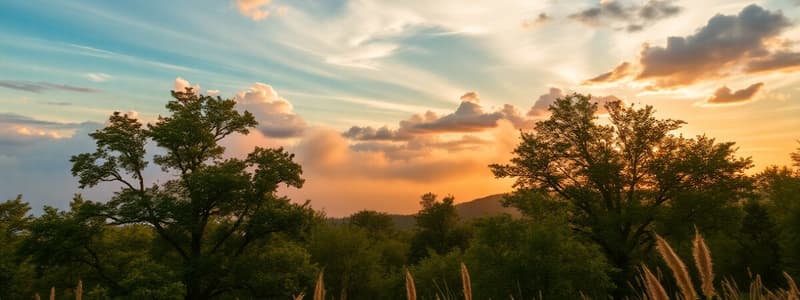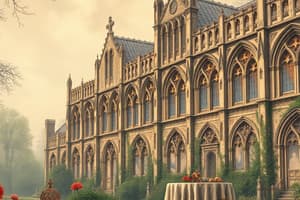Podcast
Questions and Answers
What emotion is associated with the scenery described in relation to nature's forces?
What emotion is associated with the scenery described in relation to nature's forces?
- Curiosity
- Fearfulness (correct)
- Joy
- Indifference
The content emphasizes humanity's complete dominance over nature.
The content emphasizes humanity's complete dominance over nature.
False (B)
What does the word 'sublime' refer to in the context of nature as described?
What does the word 'sublime' refer to in the context of nature as described?
The quality of greatness or beauty that inspires awe and elevates the soul.
The old Earthquake-daemon taught her young about _______.
The old Earthquake-daemon taught her young about _______.
Match the following artists to their works:
Match the following artists to their works:
What activity is the speaker engaged in while perched on the crag?
What activity is the speaker engaged in while perched on the crag?
The speaker expresses a sense of weariness in the presence of beauty.
The speaker expresses a sense of weariness in the presence of beauty.
What natural elements are mentioned as being heard by Leonard?
What natural elements are mentioned as being heard by Leonard?
The speaker's thoughts in the present moment lead to feelings of ______ for future years.
The speaker's thoughts in the present moment lead to feelings of ______ for future years.
Match the following images described in the passage with their corresponding features:
Match the following images described in the passage with their corresponding features:
Which phrase describes the speaker's emotional state during moments of weariness?
Which phrase describes the speaker's emotional state during moments of weariness?
Leonard only enjoys the sights from the top of the crag.
Leonard only enjoys the sights from the top of the crag.
What does the speaker mean by stating that beauty has not been to them 'as is a landscape to a blind man’s eye'?
What does the speaker mean by stating that beauty has not been to them 'as is a landscape to a blind man’s eye'?
Leonard would often hang over the vessel's side and _______.
Leonard would often hang over the vessel's side and _______.
What best describes the author's view on human interaction with nature?
What best describes the author's view on human interaction with nature?
The author believes nonhuman nature has no independent reason for being.
The author believes nonhuman nature has no independent reason for being.
What do the primaeval mountains teach the observer?
What do the primaeval mountains teach the observer?
Caspar David Friedrich painted 'The Monk By the Sea' in ______.
Caspar David Friedrich painted 'The Monk By the Sea' in ______.
In the author's perspective, what is a crucial ethical consideration regarding the environment?
In the author's perspective, what is a crucial ethical consideration regarding the environment?
The glaciers mentioned are described as moving slowly and cautiously.
The glaciers mentioned are described as moving slowly and cautiously.
List two elements that the author mentions as part of the natural world.
List two elements that the author mentions as part of the natural world.
The author believes that the autonomy of nonhuman nature is a corrective to human ______.
The author believes that the autonomy of nonhuman nature is a corrective to human ______.
What does the author imply about human endeavors in nature?
What does the author imply about human endeavors in nature?
What emotion does the speaker primarily reflect upon in the passage?
What emotion does the speaker primarily reflect upon in the passage?
The speaker believes that their past joyful experiences will always be present.
The speaker believes that their past joyful experiences will always be present.
What does the speaker mean by 'other gifts have followed'?
What does the speaker mean by 'other gifts have followed'?
The speaker refers to hearing 'the still, sad music of __________'.
The speaker refers to hearing 'the still, sad music of __________'.
Match the following images with their corresponding emotions from the passage:
Match the following images with their corresponding emotions from the passage:
Which of the following best describes the speaker's view of nature in their youth?
Which of the following best describes the speaker's view of nature in their youth?
What does the phrase 'aching joys are now no more' signify?
What does the phrase 'aching joys are now no more' signify?
What literary device is prominently used in the phrase 'flood of ruin'?
What literary device is prominently used in the phrase 'flood of ruin'?
Percy Shelley portrays Mont Blanc as completely untouched by human influence.
Percy Shelley portrays Mont Blanc as completely untouched by human influence.
What does the river symbolize in Shelley's poem?
What does the river symbolize in Shelley's poem?
The 'race of man' _____ in dread according to Shelley's observations.
The 'race of man' _____ in dread according to Shelley's observations.
Match the following elements from the poem with their descriptions:
Match the following elements from the poem with their descriptions:
Which imagery is used to describe the caves in the poem?
Which imagery is used to describe the caves in the poem?
The eagle is depicted as a symbol of strength and resilience in the poem.
The eagle is depicted as a symbol of strength and resilience in the poem.
What does the term 'unearthly forms' refer to in relation to the mountains?
What does the term 'unearthly forms' refer to in relation to the mountains?
The trees mentioned in the poem are described as _____ and shatter'd.
The trees mentioned in the poem are described as _____ and shatter'd.
What is the overall tone of Percy Shelley's portrayal of the natural landscape?
What is the overall tone of Percy Shelley's portrayal of the natural landscape?
The poem suggests that nature's influence on humanity is passive and one-sided.
The poem suggests that nature's influence on humanity is passive and one-sided.
Flashcards
The speaker's evolving perspective
The speaker's evolving perspective
The speaker, reflecting on his past, feels a mix of joy and regret about his youthful exuberance, now lost and replaced with a more mature sensibility. He acknowledges the transition from a time of pure animalistic joy to a state of deeper contemplation and understanding, where the music of humanity, though somber, is a powerful force for reflection.
The 'coarser pleasures' of youth
The 'coarser pleasures' of youth
The 'coarser pleasures' of the speaker's youth are described as being 'animal movements,' emphasizing a physical and instinctive enjoyment of life, devoid of introspection. His memories are 'dim and faint,' suggesting a bittersweet longing for that lost innocence.
The speaker's acceptance of loss
The speaker's acceptance of loss
While mourning the loss of his youthful spirit, the speaker acknowledges that time has brought him other 'gifts,' implying the possibility of a new understanding of life, even if it comes at the cost of lost vitality.
The music of humanity
The music of humanity
Signup and view all the flashcards
Nature's evolving role
Nature's evolving role
Signup and view all the flashcards
The speaker's journey of self-discovery
The speaker's journey of self-discovery
Signup and view all the flashcards
The speaker's overall tone
The speaker's overall tone
Signup and view all the flashcards
Nature's restorative power
Nature's restorative power
Signup and view all the flashcards
Inner connection to nature
Inner connection to nature
Signup and view all the flashcards
Appreciation for nature's gifts
Appreciation for nature's gifts
Signup and view all the flashcards
Nature's lasting influence
Nature's lasting influence
Signup and view all the flashcards
Nature as vivid imagery
Nature as vivid imagery
Signup and view all the flashcards
Nature's transcendence of physical presence
Nature's transcendence of physical presence
Signup and view all the flashcards
Nature as a refuge in urban environments
Nature as a refuge in urban environments
Signup and view all the flashcards
Nature's impact on mood
Nature's impact on mood
Signup and view all the flashcards
The multi-sensory experience of nature
The multi-sensory experience of nature
Signup and view all the flashcards
Sublime and Strange
Sublime and Strange
Signup and view all the flashcards
Passive Influencings
Passive Influencings
Signup and view all the flashcards
Mont Blanc's Majesty
Mont Blanc's Majesty
Signup and view all the flashcards
Unearthly Forms
Unearthly Forms
Signup and view all the flashcards
Frozen Floods
Frozen Floods
Signup and view all the flashcards
Desert of Storms
Desert of Storms
Signup and view all the flashcards
Eagles and Wolves
Eagles and Wolves
Signup and view all the flashcards
Hideously Heap'd
Hideously Heap'd
Signup and view all the flashcards
Autonomy of nonhuman nature
Autonomy of nonhuman nature
Signup and view all the flashcards
Intricately tied to ecological systems
Intricately tied to ecological systems
Signup and view all the flashcards
Human arrogance
Human arrogance
Signup and view all the flashcards
Primaeval mountains
Primaeval mountains
Signup and view all the flashcards
Glaciers creep
Glaciers creep
Signup and view all the flashcards
Frost and the Sun in scorn of mortal power
Frost and the Sun in scorn of mortal power
Signup and view all the flashcards
The naked countenance of earth
The naked countenance of earth
Signup and view all the flashcards
The works and ways of man, their death and birth
The works and ways of man, their death and birth
Signup and view all the flashcards
All things that move and breathe with toil and sound Are born and die, revolve, subside and swell.
All things that move and breathe with toil and sound Are born and die, revolve, subside and swell.
Signup and view all the flashcards
Saving wilderness
Saving wilderness
Signup and view all the flashcards
Sublime
Sublime
Signup and view all the flashcards
Physical Helplessness vs. Mental Pre-Eminence
Physical Helplessness vs. Mental Pre-Eminence
Signup and view all the flashcards
Attractiveness of Fearfulness
Attractiveness of Fearfulness
Signup and view all the flashcards
Vulgar Commonplace vs. Sublime
Vulgar Commonplace vs. Sublime
Signup and view all the flashcards
Self-Preservation in the Face of Nature
Self-Preservation in the Face of Nature
Signup and view all the flashcards
Study Notes
Romantic Natures & The Trouble With Wilderness
- JMW Turner, Hannibal and his army crossing the Alps is an example of Romantic art.
- Wilderness is profoundly a human creation at particular moments in human history.
- Wilderness hides its unnaturalness.
- The Sublime (Romantic aesthetics) features vast, grand, uninhabited landscapes.
- The U.S. myth of the (vanishing) frontier relates to European settlers' encounter with the West and their identity.
- National and spiritual identities, like settler/colonial identities are threatened by the "loss" of the frontier, fueling wilderness conservation efforts.
- Protected National Parks reflect landscape ideals of Romanticism.
The Trouble With Wilderness
- Wilderness creates an antithesis between human beings and nature.
- Wilderness is a place where un-natural humans go to restore vitality, perspective, and spirituality (ironically, humanity).
- Wilderness presumes the class privilege of urban elites who can escape to nature.
- Wilderness erases, invisibilizes, or portrays as abuse the ways people live and work in nature.
- Wilderness hides the history of forced removals and genocidal wars against Indigenous Americans.
- Wilderness is a flight from history and a disavowal of historical entanglement.
- Wilderness blocks an environmental justice perspective that acknowledges poverty, racism.
Discussion Question
- Major Jackson's "Pest" or Gerald Barrax's "To Waste at Trees" present a contrasting perspective on nature as wilderness.
Let's Prepare: The Utopian Worlds' Fair
- Students form groups (10-11 people) and create a utopia.
- Specific roles—such as music, sound design, set design, scenography, iconography, costumes, food preparation, animation, and script writing— are needed.
- The groups brainstorm principles, rituals, festivals, or events that epitomize their utopia.
- The chosen activities showcase the utopia's social dream to outsiders.
Studying That Suits You
Use AI to generate personalized quizzes and flashcards to suit your learning preferences.




